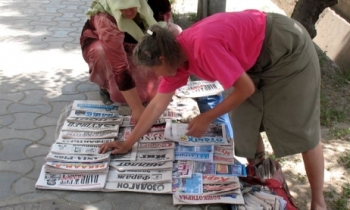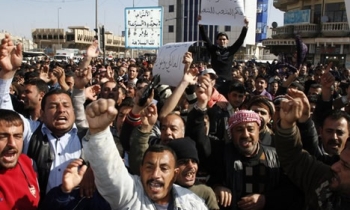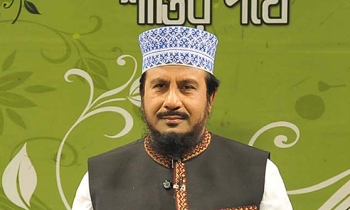There cannot be a country in the world in which the words al-Jazeera do not provoke some sort of reaction. Now the Qatar-headquartered broadcaster is putting together a new worldwide English language TV station and all eyes are on Doha.
Governments are apparently trying to place spies in its ranks, competing networks are badmouthing its output before a single hour is aired and senior journalists are signing up from the BBC, ITV and Sky. Never before has such political attention been focused on so modest a channel launch. The world is watching al-Jazeera.
"There are plenty of salivating critics waiting to tear it apart," says Hugh Miles, author of al-Jazeera: How Arab TV News Challenged The World. "It will be embarrassing for them because they will be growing up in public, they will have to hit the ground running."
The new station, called al-Jazeera International, will launch early in 2006. Based in Washington, London, Qatar’s Doha and Kuala Lumpur, it will broadcast discussion shows and features as well as news broadcasts. The station, which will be in English, will focus on the developing world, and Africa and Asia in particular.
Al-Jazeera is the subject of unprecedented global controversy. The station has broadcast messages from Osama bin Laden, showed images of the carnage in the aftermath of US and UK attacks and footage of hostages being executed.
"In the period before 9/11 American media were extremely favourable towards al-Jazeera because they broadcast negative stories about certain countries in the Arab world and news that you didn’t get on government controlled stations," says Media watch.org editor Danny Schechter, who heads the media monitoring pressure group. Schechter has visited the al-Jazeera headquarters and made a film, Weapons Of Mass Deception, about the Western media’s war coverage.
"60 Minutes [on CBS] did a show in the summer before 9/11 about how al-Jazeera was a harbinger of democracy in the Middle East," he says. "But when they started showing footage of al-Qaeda they were portrayed as a transmission network for propaganda for terrorists."
But while the West portrayed al-Jazeera as terrorist stooges, the local audience thought the station pandered too heavily to the West and to Israeli influence. Miles says: "It has been banned in Saudi Arabia, Syria, Tunisia, every other Arab state. The heads of state in all the countries in the Arab region hate it and want to close it down. In the West it is seen as being an Arab apologist station and in America as being a propaganda arm of the Islamist war machine. In Arab states many people think it is run by the CIA or [Israeli security force] Mossad."
Controversy on this scale has had serious effects. The station’s journalists are often banned from neighbouring Arab states. Some, such as Tarek Ayyoub, have been killed and just last week Tayssir Alouni, who once interviewed Osama bin Laden, was sentenced to seven years’ jail for alleged terrorist links by a Spanish court. An al-Jazeera cameraman is imprisoned in the US military jail at Guantanamo Bay and claims only to have been interrogated about the station, not about any terrorist activity. Sami Muhyideen al-Hajj also claims that he was offered his freedom by US agents if he agreed to spy on the channel for them.
Only one thing has kept the station going, providing the cash on which it runs and the political protection it needs: the support of Qatar’s ruler. Sheikh Hamad bin Khalifa al-Thani, the current emir, funds the station and is likely to continue to do so for some time. "We will be funded for a number of years by the emir," says the station spokesman. "We fully expect, eventually, to be supported entirely by subscription and ad revenues."
Miles believes the station need not worry about money. "The emir has spent more on art in the past couple of years than he has keeping al-Jazeera going. It’s peanuts to him," he says.
The new English language station is not a financial gamble, then, but it is a reputational one. Al-Jazeera was recently named one of the top five brands in the world by Interbrand. It must overturn negative perception in the West and must compete with much bigger, more famous stations.
"I met with the two heads of the station," says Ron MacKay, a Scottish journalist (and Sunday Herald sports writer) who was considering launching a similar station on the eve of the last Gulf war. "They are planning a mainstream station, but I’m not sure the right thing to do is to be just another station."
The focus of the station will be firmly on the developing world, which will mark its coverage out. "We will offer news from under-reported parts of the world, including places like Africa and China," says the spokesman. "This is what distinguishes us from the old international media based in the West who treat these markets as afterthoughts."
Mark Seddon is joining the station after editing the left-leaning periodical Tribune for 10 years. "I was just very excited about being part of something so new," he says.
"A new channel coming out of the developing world with global reach is something I don’t think we’ll see again."
Former head of STV news Paul McKinney is also joining the operation, along with former ITN News At Ten editor John Pullman and former BBC Breakfast editor Paul Gibbs.
The station has said that it would employ hundreds of people by the time of launch. Each of the four bases will operate the station between 6pm and midnight, local time. Rumours of the privatisation of al-Jazeera abound, and the station appointed Ernst & Young to look into financing models earlier this year, but no final decision has been made.
So much attention is paid to the Arabic channel that flights were grounded in 2003 because CIA agents misinterpreted scrolling numbers on the screen as a terrorist message. Al-Jazeera is used to scrutiny, but come launch day in March 2006, it should be ready for even more.









